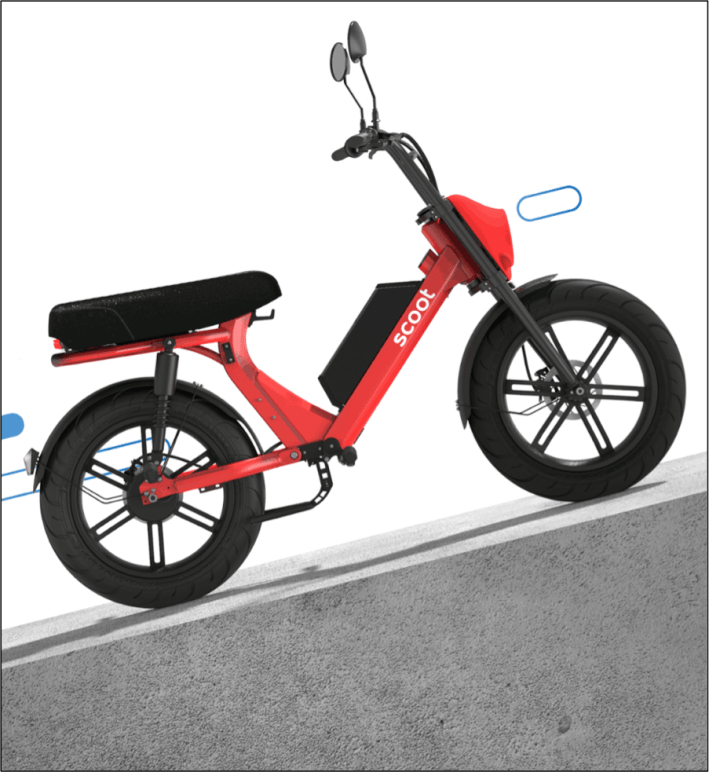Demand “Safe Streets for Everyone” at the National Bike Summit, hosted by the League of American Bicyclists March 15-17. Meet advocates from across the U.S. who are reshaping their communities and make your voice heard on Capitol Hill. Explore the summit here.
A new crop of electric mopeds has sprouted in Austin, Texas, once again provoking widespread pearl-clutching about pedestrian and bicyclist safety — discussions that ignore just how much safer mopeds are than cars.

The move comes nine months after Bird acquired moped company Scoot Rides, and the pedal-less motorbikes will retain the subsidiary's mildly confusing name and distinctive red branding. But whatever name Bird stamps on the side, its Austin experiment is still the first time that a multi-billion-dollar micromobility company has experimented with vehicles that can travel faster than an e-bike — that's raising some big questions about the future of the industry.
Misplaced skepticism?
Pretty much ever since micromobility apps themselves were invented, safe streets advocates have been debating whether or not they're a good thing for our cities. On the "pro" side, some argue that the popularity of startup-owned e-scooters and their ilk could be leveraged to build more protected bike lanes for everyone to use — or bike/scoot lanes, or Complete Streets lanes, or whatever we're supposed to call them now. (Former Lime Bike executive Scott Kubly, for example, was a prophet for the notion that more scooters and more mopeds would lead to more space and more safety for cyclists and pedestrians.)
And of course, anything that replaces a car trip is a net good for society, because a low-speed scooter is intrinsically safer than a car for the most vulnerable road users.
But as micromobility options get faster, new skeptics are bound to come out of the woodwork — especially when it comes to safety. Riders on traditional, stand-up, 15-mph max Bird scooter might sometimes spook a pedestrian (especially one on a sidewalk), but they're highly unlikely to actually kill a walker in a crash. A moped, though, is quite a bit faster — and some worry it could be more dangerous than a scooter if it shows up in the bike lane.
For pedestrian advocates, the biggest worry about the Bird moped is that it's an unknown entity being deployed by a private company whose central motivation is profit, not safety.
"Unfortunately, we have seen that with each wave of new micro mobility, there's an 'Act first, think second' attitude," said America Walks Executive Director M. Katherine Kraft. "It results in more of the same issues we have seen in the past; reducing safe spaces for people walking, creating obstacles to public rights of way, and distracting from the hard work that needs to be done to create safer and more accessible streets for all. At the end of the day, it needs to be less about [companies'] bottom line and more about the people they claim to serve."
Ranking the moped among deadly vehicles on our roads
There is only limited data about crashes between mopeds and pedestrians and cyclists — mostly because the National Highway Traffic Safety Administration aggregates crash data for low-speed, sit-down-scooters with ultra-deadly high-speed motorcycles. But there are reasons to be skeptical that widespread moped usage will be harmless to pedestrians. Countries where mopeds are popular, after all, are beginning to see the vehicles as a slightly less-dangerous cousin to the traditional car. Amsterdam banned most mopeds from bike lanes last year, citing an estimated 300 annual injuries in moped-related crashes and new technology that had taken the average scooter's speed above the country's legal bike lane speed limit of 25 kilometers per hour (about 15 miles.)
But as anti-bike advocates so dearly love to say: America ain't Amsterdam. And some advocates think we'd be lucky if our biggest problem were a few low-speed motor vehicles in bike lane; the top speed of the Scoot is just 20 miles per hour.
"Definitely the big killer is automobiles — especially for pedestrians — not mopeds," said Robin Stallings of the advocacy group Bike Texas. "When it comes to unsafe vehicles on our roads, scooters and mopeds are way, way down the list."
Cautious optimism
As mopeds become a bigger part of every city landscape, most advocates seem to be urging cautious optimism about the growing mode — though staying vigilant of pedestrian and cyclist safety will be important, especially for vehicles slow enough to be allowed to mingle with non-drivers, but fast enough to be more dangerous than a bike.
The Scoot moped falls pretty firmly into that gray area. They will be allowed in Austin bike lanes, according to the company — and even if riders opt for the car-dominated parts of the road, they'll still have to contend with non-drivers at intersections. Rival moped company Revel is facing a lawsuit in New York after one of its riders slammed into a cyclist last June, causing a serious ankle injury.
It should be noted that Revel themselves unleashed 1,000 scooters onto Austin streets in November of 2019; its models, which top out at a considerably speedier 30 miles per hour, are not allowed on shared-use paths in the City of the Violet Crown.
But Bird's announcement is unique for what it might represent: a future where all micromobility companies move just a little faster than they used to. That could be a good way to wean car-obsessed Americans off of their far speedier (and deadlier) vehicles — or it could be the death knell for slower e-scooters, and the protected infrastructure their riders were just beginning to demand. Either way, as Bird, Revel and their ilk expand their fleets in Austin, the Texas city will be one to watch.






